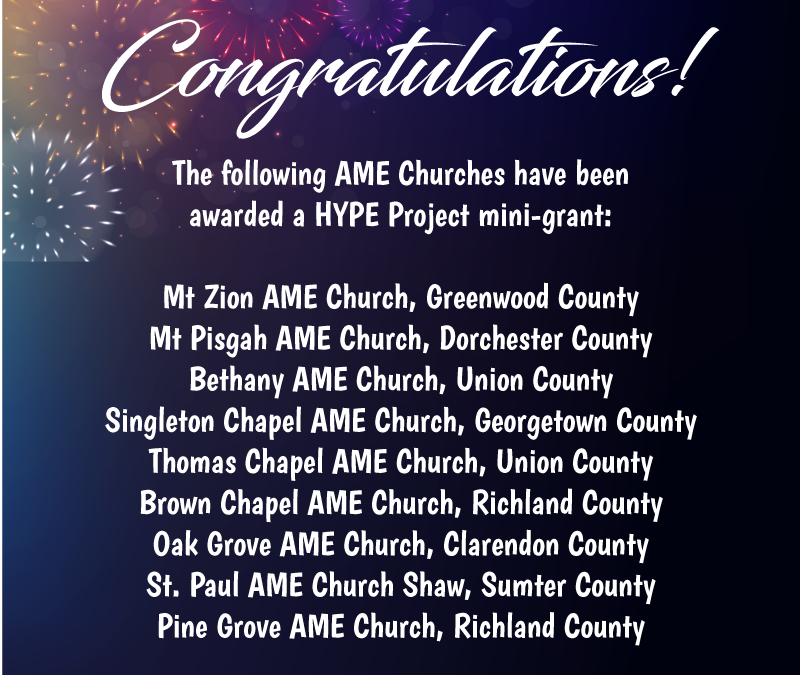
Mar 20, 2020 | HYPE Civic Action Projects, News
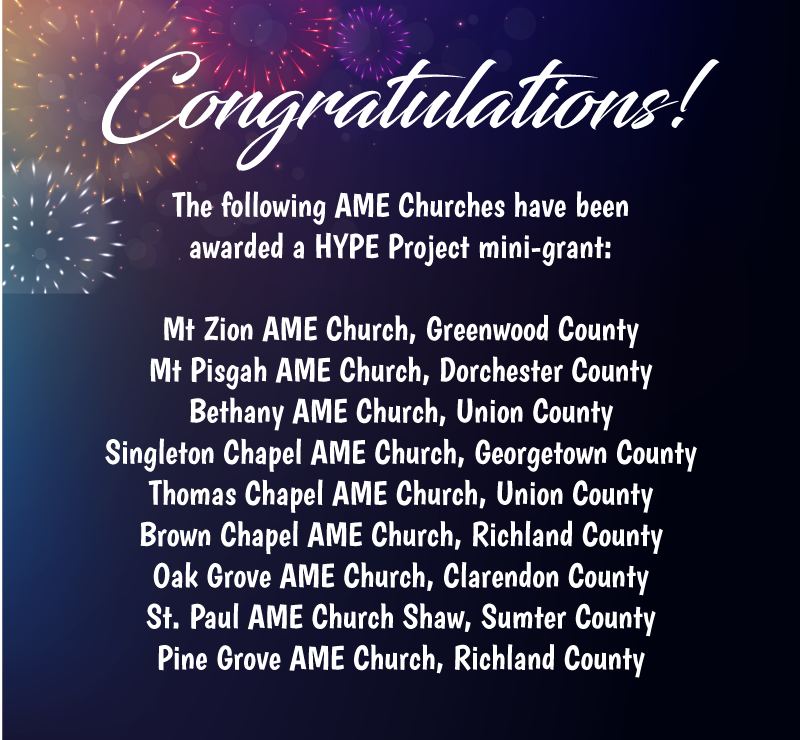 For the second year in a row, Eat Smart Move More South Carolina (ESMMSC) is partnering with the 7th Episcopal District of the AME Church to teach teens about The Healthy Young People Empowerment (HYPE) Project and to help guide them through a public health project that focuses on healthy eating and/or active living in their churches or communities.
For the second year in a row, Eat Smart Move More South Carolina (ESMMSC) is partnering with the 7th Episcopal District of the AME Church to teach teens about The Healthy Young People Empowerment (HYPE) Project and to help guide them through a public health project that focuses on healthy eating and/or active living in their churches or communities.
This year, eight churches were selected through a competitive application and review process to receive mini-grants and form HYPE teams. Four of the HYPE teams are new grantees that will identify new projects, while four are returning teams that will build upon their existing grant work. In addition to the eight teams, the Union County Public Health Taskforce funded an additional AME church that will work alongside the HYPE YPD Teams.
“The faith community has a long history of meeting the needs of their congregations and local communities, and this is especially true for African-American churches,” said Trimease K. Carter, Manager of Youth Engagement at ESMMSC. “This means the AME church will have an even larger impact on health equity and youth development.”
This opportunity is funded through a grant that ESMMSC received from the South Carolina Department of Health and Environmental Control’s Division of Division of Injury and Substance Abuse Prevention. Through this partnership, HYPE Teams will address healthy eating and active living while also weaving in safety and injury prevention components into their projects.
2020 New HYPE Teams
Mt Zion AME Church, Greenwood County
Mt Pisgah AME Church, Dorchester County
Bethany AME Church, Union County
Singleton Chapel AME Church, Georgetown County
Thomas Chapel AME Church, Union County
2020 Returning HYPE Teams
Brown Chapel AME Church, Richland County
Oak Grove AME Church, Clarendon County
St. Paul AME Church Shaw, Sumter County
Pine Grove AME Church, Richland County
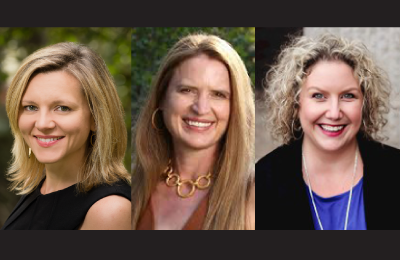
Jan 31, 2020 | News
 Eat Smart Move More South Carolina is pleased to announce the election of the new board of directors’ chairman and two new members.
Eat Smart Move More South Carolina is pleased to announce the election of the new board of directors’ chairman and two new members.
New Board Chairman Anna Lewin succeeds Jen Wright, whose term as chairman ended in 2019 but continues to serve as a board member. Joining the board are two Camden residents: Representative Laurie Funderburk and Lori Phillips, MPH, of South Carolina Department of Health and Environmental Control (SCDHEC).
“We are thrilled to have Anna serve as Board Chairman and to welcome our new board members, whose wealth of experience and expertise will help position ESMMSC for further growth and success,” said ESMMSC Executive Director Meg Stanley. “All of our board members are highly respected in their fields and have great influence on healthy eating and active living in their communities, as well as at the state level.”
Anna Lewis is the chief executive officer of the South Carolina Community Loan Fund (SCCLF), headquartered in Charleston. The SCCLF focuses on advancing equitable access to capital to build assets and benefit communities and people most in need of economic opportunity. Anna currently serves on the boards of South Carolina Coalition for the Homeless, SC Food Policy Council, SC Community Capital Alliance, and Local Emergency Food and Shelter Board.
Laurie Funderburk is a member of the SC House of Representatives since 2004 representing Kershaw County. Laurie is a businesswoman and attorney in Camden. She is co-owner of Books on Broad and is an insurance agent with Funderburk Health + Life. She has been and continues to be involved with several local and statewide organizations including SC Department of Agriculture Food Policy Council, Women in Government, Camden Zoning and Planning Commission, Kershaw County Community Medical Clinic, and United Way of Kershaw County. A founder of the Kershaw County Farmers Market, Laurie is currently the Team Leader for LiveWell Kershaw’s Community Health Improvement Plan’s Healthy Eating Active Living Action Team. She is also Chair of her church’s Health and Wellness Committee. Laurie is passionate about healthy lifestyles and the mission of Eat Smart Move More SC.
Lori Phillips, MPH, is the Director of the Division of Nutrition, Physical Activity, and Obesity Prevention at the SCDHEC. In this role, she and her team focus on convening key stakeholders, communicating data and best practices, and consulting with partners to improve systems that create environments that promote healthy eating and active living. She has over 20 years of
experience in community-based chronic disease prevention and education at local and state levels.
The slate of board members for 2020 is listed on the Board page.
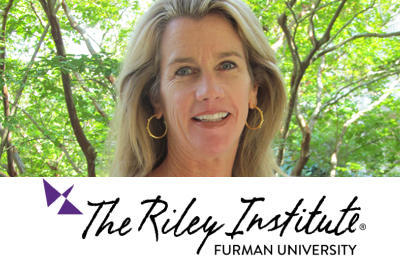
Jan 30, 2020 | News
 Meg Stanley, executive director of Eat Smart Move More South Carolina, joins other leaders selected from across the Midlands and surrounding area to participate in the Riley Institute at Furman’s 13th class of Diversity Leaders Initiative (DLI).
Meg Stanley, executive director of Eat Smart Move More South Carolina, joins other leaders selected from across the Midlands and surrounding area to participate in the Riley Institute at Furman’s 13th class of Diversity Leaders Initiative (DLI).
“Discovering ways in which differences can strengthen our organizations is of utmost importance as we seek to grow and support a thriving economy and rich culture,” said Dr. Donald Gordon, executive director of the Riley Institute.
DLI class members are identified through a rigorous process including nominations from existing Riley Fellows, application, and interview. Individuals are selected to join the class based on their capacity to impact their organizations and communities.
Over the course of five months, Stanley will take part in a highly interactive curriculum consisting of case studies, scenario analyses and other experiential learning tools that maximize interaction and discussion among classmates and facilitate productive relationships.
Stanley will also work with other class members in one of five Capstone project groups formed to respond to real issues in the community.
The DLI classes are expertly facilitated by Juan Johnson, an independent consultant and former Coca-Cola vice president.
“DLI is unique among South Carolina’s leadership programs. In addition to the opportunity to develop new relationships and take part in positive action in their communities, participants gain deep knowledge of how to effectively manage and lead diverse workers, clients and constituents,” said Johnson.
DLI graduates become Riley Fellows, members of a powerful, cross-sector, statewide leadership network that includes CEOs of corporations, mayors, city and county council members, legislators, school superintendents, pastors and rabbis, non-profit heads, chamber of commerce directors, and community leaders. In addition to the Midlands, DLI classes are selected annually in the Upstate and Lowcountry.
“We now have more than 2200 Riley Fellows statewide. Each new class further extends the reach and impact of leaders willing to work together to make South Carolina a better place to live and work for all its residents,” said Gordon.
To see a full list of participants and for more information about the Diversity Leaders Initiative, visit https://riley.furman.edu/diversity.
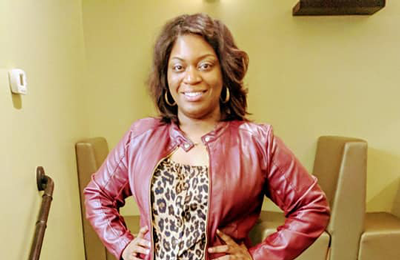
Jan 30, 2020 | News
 Youth engagement is more than just a buzzword. It’s a movement happening across the United States, and Eat Smart Move More South Carolina (ESMMSC) is in the thick of it. The Healthy Young People Empowerment (HYPE) Project, a program at ESMMSC, has been gaining attention since its inception in 2012. From its beginnings in Fairfield, Pickens, and Richland counties to nationwide trainings for the University of Arkansas Cooperative Extension Service and the National 4-H Club, more and more organizations are learning about the policy, system, and environmental change (PSE) process and engaging youth.
Youth engagement is more than just a buzzword. It’s a movement happening across the United States, and Eat Smart Move More South Carolina (ESMMSC) is in the thick of it. The Healthy Young People Empowerment (HYPE) Project, a program at ESMMSC, has been gaining attention since its inception in 2012. From its beginnings in Fairfield, Pickens, and Richland counties to nationwide trainings for the University of Arkansas Cooperative Extension Service and the National 4-H Club, more and more organizations are learning about the policy, system, and environmental change (PSE) process and engaging youth.
National and international attendees of the National Youth At Risk Conference will have an opportunity to learn about The HYPE Project, March 8-11 in Savannah. More specifically, attendees will hear from Youth Engagement Manager Trimease K. Carter as she presents during a breakout session on March 11 at 11:15 am. During her presentation, Engaging Youth Advocates Through The Healthy Young People Empowerment (HYPE) Project, Carter will make the case for engaging youth, especially youth of color, as agents for change. The presentation will also demonstrate how The HYPE Project model has been effective at engaging youth advocates around obesity prevention projects.
“This is a great opportunity to put The HYPE Project in front of schools and organizations that may be interested in this type of model. It can be incorporated into any school, program, or learning environment because it teaches youth the right way to advocate for issues close to their hearts,” said Carter. “While our curriculum focuses on healthy eating and active living, anyone can take this model and customize it to fit their youth engagement and youth advocate needs.”
The National Youth At Risk conference, hosted by Georgia Southern University, draws more than 1,200 national and international participants. The conference trains adults who serve youth to create safe, healthy, caring, and intellectually empowering educational environments that foster the well-being of all children and adolescents. Participants learn about current research-based educational programs and strategies, which empower young people to overcome at-risk conditions that may threaten their safety, health, emotional needs, and academic achievement.
To learn more about The HYPE Project, visit our Youth Engagement page. To learn more about the Youth At Risk Conference, visit https://academics.georgiasouthern.edu/ce/conferences/nationalyouthatrisk/.
Nov 19, 2019 | News
Over the past two years, Eat Smart Move More South Carolina has funded 28 communities across South Carolina for small-scale projects that helped catapult their healthy eating and active living (HEAL) initiatives. Now, ESMMSC is entering its fourth of five rounds of the mini-grant application process. Communities, schools, municipalities, and non-profits are encouraged to apply for funding for healthy eating and active living projects. The application deadline is January 15.
The mini-grants, up to $5,000, should be used to implement projects that support policy, system, or environmental changes. In most of the examples below, project leaders leveraged funds:
- Shady Grove Baptist Church Community Garden: Located in a food desert in Greenville County, Shady Grove Baptist Church wanted to increase the capacity of their community garden to feed more people in their community. To accomplish this goal, church leaders and garden volunteers were in need of tools to help cultivate and harvest the produce. Funds were used to purchase those tools for a community garden that was still in its early stages of growth.
- Engaging the Youth of Bamberg County: The Bamberg County Health Coalition used funds to create two HYPE teams: 1) youth from both school districts and 2) youth involved in Job Corps. Both HYPE team were trained on The HYPE Project to engage youth in health and wellness projects. Upon completion of the training, the HYPE teams identified and completed the following projects: 1) the school districts team revitalized a park in the Town of Bamberg by repairing the swings and tennis court and 2) the Job Corps team created a community garden at the Job Corps site to feed the community.
- Eat Smart Move More Newberry County Summer Wellness Challenge: The Summer Wellness Challenge, open to all elementary school students in Newberry County, promoted the use of community resources that support healthy eating and physical activity during Summer break. Funds were used to print flyers and challenge cards to help students track their summer activity, and to purchase prize incentives for those who participated. This project also included a parent survey to help identify community perceptions about access to HEAL resources.
- Destination Downtown Dillon – Keep in the Loop: The City of Dillon has been working to make it a walk-friendly community. As a result of their Active Corridors Plan, the city identified a one-mile walkable loop located in the Main Street Commercial District. The city used funds to purchase wayfinding signage to promote this unique asset of Downtown Dillon.
- Little River Park Accessibility Project: Eat Smart Move More Laurens County and the Laurens County Disabilities and Special Needs Board improved accessibility and ADA compliance in a local park. The group removed barriers such as mulch and installed rubber mats. They also installed ADA signage, table ledges, and removed other barriers to mobility.
The application for the last Let’s Go 3.0 funding opportunity is open. For more information about the Let’s Go! 3.0 initiative and to submit an application, visit www.eatsmartmovemoresc.org. If you have questions about this process or projects that are acceptable, contact Kelsey@eatsmartmovemoresc.org.
These opportunities are funded through a grant from the BlueCross BlueShield of South Carolina Foundation, an independent licensee of the Blue Cross and Blue Shield Association.
Nov 19, 2019 | News
Investing in communities is key not only to economic development, but also to community health and lifestyle improvement. It is a common view that more money is the answer to addressing community health, but just how big of an investment is necessary to make a difference? ESMMSC’s Kelsey Allen will expand on this topic at the 2019 Investing in Community Summit, December 3-4, at the Columbia Metropolitan Convention Center.
During her presentation on Thursday, December 3 at 3:00 p.m., Kelsey will provide lessons learned from the Let’s Go! South Carolina project and how ESMMSC has used those lessons learned to make lasting change happen in communities across the state. In Let’s Go 3.0: How small amounts of funding can lead to lasting change, Kelsey will talk about the idea behind the Let’s Go 3.0 project – small amounts of funding and targeted technical assistance can potentially create a ripple effect of momentum and investment into a community.
Now halfway through the Let’s Go 3.0 project, the initial results are in: these small investments of up to $5,000 have shown promising signs of increasing access to healthy foods and places to be active in communities around the state. This session will share two case studies of mini grant projects that have led to policy changes in their communities. In addition, the session will end with practical tools and resources to incorporate policy and advocacy strategies into community health improvement. This session can be found in the Invest SC track.
The 2019 Investing in Community Summit will highlight the role of capital access in addressing the systemic barriers we face to building strong, equitable communities. Join SC Community Loan Fund for this two-day summit to learn about projects, resources, and policy efforts that support underinvested South Carolina communities. Connect with funders, hear from a cross-sector group of speakers who are working to make an impact across our state, and gain the knowledge and tools needed to invest in your community. Register online today!
Nov 19, 2019 | News
What do you get when you take a healthy eating, active living conference to the Pee Dee? You get the largest gathering of public health and community coalition partners ever!
With more than 219 people in attendance, Florence and the Pee Dee were the hosts of the 2019 Leadership Summit for Healthy Communities, and it did not disappoint! More than half of those in attendance (56%) were there for the first time, and the Pee Dee accounted for 31 percent of the audience with organizations having a statewide presence coming in at the top at 33 percent.
“A few of our goals in having the Summit in Florence was to reach communities in the Pee Dee, spotlight their work through some of the breakout sessions, and to broaden our reach across the state,” said Meg Stanley, executive director at Eat Smart Move More South Carolina. “We are very pleased to have met our goals, and we look forward to partnering with not just those in the Pee Dee, but with all of our new and existing partners to reduce obesity and chronic disease rates in South Carolina.”
Out of the 15 breakout sessions offered, four sessions focused on healthy eating and active living initiatives happening in the Pee Dee region. All other breakout sessions addressed strategies that can be duplicated in any area of the state – whether partially or completely. One of the most popular breakout sessions came from Growing COB (Calhoun, Orangeburg, Bamberg), a community coalition that has successfully built and sustained community gardens in the rural, underserved tri-county area through partnerships and leveraging resources.
One attendee said, “Excellent work. The information shared and photos provided makes it evident that Growing COB is an effective program. This presentation has indeed sparked great interest for me to advocate for community garden opportunities! I was truly blessed as well as inspired by such a worthwhile and much needed opportunity for communities to thrive!!!”
Evaluation is a key component in any project and event of this magnitude. Along with the Leadership Summit Planning Committee, ESMMSC will use the collected data to plan future Summits, ensure event content aligns with the needs of the community, and better communicate with our partners and community coalitions. The information will also be used to plan webinars and other opportunities throughout the year.
What topics can you look forward to seeing during a webinar, workshop, or future Leadership Summit? Those surveyed said Funding and Leveraging Resources, Youth Engagement, and Capacity Building. The 2020 Leadership Summit for Healthy Communities date and location will be announced soon. Keep your eyes open and be ready to mark your calendar!
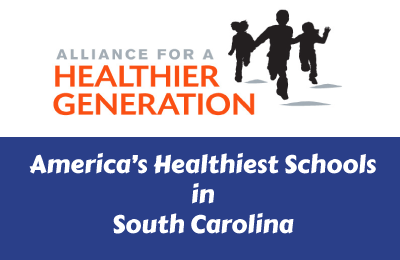
Nov 11, 2019 | News
 Thirty-two schools across South Carolina have been named to the 2019 list of America’s Healthiest Schools by the Alliance for a Healthier Generation, receiving national recognition for their commitment to students’ health and well-being.
Thirty-two schools across South Carolina have been named to the 2019 list of America’s Healthiest Schools by the Alliance for a Healthier Generation, receiving national recognition for their commitment to students’ health and well-being.
A total of 355 schools nationwide were selected based on a rigorous set of criteria—from availability of nutritious foods to access to quality physical education opportunities—as part of Healthier Generation’s Healthy Schools Program. South Carolina tied with Missouri for the 4th highest number of award-winning schools, with 4 schools receiving the National Healthy Schools Silver Award and 28 receiving the National Healthy Schools Bronze Award.
“Achievement of this award demonstrates the commitment of these schools to promoting the well-being of students, staff, and families, as well as, their understanding of the importance of wellness to student and school success,” said, Beth Barry, Senior Program Manager, SC for the Alliance for a Healthier Generation. “The support of district and school administrators, school wellness leaders and teams, and community engagement are significant factors in becoming one of America’s Healthiest Schools.”
All of America’s Healthiest Schools have earned National Healthy Schools Awards, a prestigious achievement that celebrates schools that meet or exceed expert-recommended standards set by Healthier Generation’s Healthy Schools Program for serving healthier meals and snacks, getting students moving more, offering high-quality health and physical education, and supporting staff wellness.
“We are thrilled to see another strong showing of dedicated schools that are taking steps to create healthier school environments that support children’s physical, social, and emotional health,” said Kathy Higgins, chief executive officer at the Alliance for a Healthier Generation. “More than a decade ago, we sought to help schools create a culture of health that puts the well-being of youth and educators front and center. We are blown away by the number of schools, especially those serving youth from underserved communities, that doubled down on their commitment to health and academic success. This year’s list is a continued testament to the nationwide movement for improving the social, emotional and physical health of current and future generations.”
Any school can join Healthier Generation’s Healthy Schools Program to access trainings, resources, and technical assistance by visiting HealthierGeneration.org.
To view the complete list of America’s Healthiest Schools, visit HealthiestSchools.org.
The Alliance for a Healthier Generation believes every child deserves a healthy future. For over a decade, Healthier Generation has empowered kids to develop lifelong healthy habits by ensuring the environments that surround them provide and promote good health. Driven by our passion that all young people deserve a chance to live healthier lives, our work, in total, has reached up to 28 million kids across the country. To learn more and help make a difference, visit Healthier Generation.org and join us on Facebook and Twitter.

Oct 4, 2019 | News
 Many communities across South Carolina are experiencing success in changing built environments into active community environments that promote active lifestyles, and in doing so have seen economic and fiscal benefits. Active community environments are places where people of all ages and abilities can be physically active for both recreation and transportation purposes.
Many communities across South Carolina are experiencing success in changing built environments into active community environments that promote active lifestyles, and in doing so have seen economic and fiscal benefits. Active community environments are places where people of all ages and abilities can be physically active for both recreation and transportation purposes.
At the Leadership Summit for Healthy Communities on October 29 in Florence, participants can learn about active community environment strategies happening in rural areas of the state. Whether it’s improved sidewalks, bicycle-friendly sharrows, and multi-use paths and trails or adopting open community use policies, Leadership Summit participants will gain a clear picture of how creating active community environments can benefit everyone.
Building Multi-Sector Support for Active Community Environments in Lancaster County, South Carolina
The ESMM Lancaster County chapter has built public and private support for a variety of active living and built environment policies in the rapidly growing area. Presenters will share a variety of policy-based strategies that are currently being implemented to increase physical activity opportunities throughout Lancaster County. You will learn about the challenges of managing both the rural and suburban resident expectations of municipal recreation facilities and how strategies change the built environment.
Where There’s a Will There’s a Way (To Funding Your Trail)
Communities in coastal South Carolina have found a wide variety of ways to fund transformative, beloved sections of the East Coast Greenway. Learn how small rural towns and major metropolitan areas have leveraged abandoned rail lines, private philanthropy, Forest Service roads, and federal transportation dollars to build unique, safe places for physical activity in the Lowcountry. You will find out about public and private funding options, what’s involved in accessing these types of funds, and strategies for creating multi-use trails.
Register for these sessions at the Leadership Summit today! Click here to register!

 For the second year in a row, Eat Smart Move More South Carolina (ESMMSC) is partnering with the 7th Episcopal District of the AME Church to teach teens about The Healthy Young People Empowerment (HYPE) Project and to help guide them through a public health project that focuses on healthy eating and/or active living in their churches or communities.
For the second year in a row, Eat Smart Move More South Carolina (ESMMSC) is partnering with the 7th Episcopal District of the AME Church to teach teens about The Healthy Young People Empowerment (HYPE) Project and to help guide them through a public health project that focuses on healthy eating and/or active living in their churches or communities.





 Many communities across South Carolina are experiencing success in changing built environments into active community environments that promote active lifestyles, and in doing so have seen economic and fiscal benefits. Active community environments are places where people of all ages and abilities can be physically active for both recreation and transportation purposes.
Many communities across South Carolina are experiencing success in changing built environments into active community environments that promote active lifestyles, and in doing so have seen economic and fiscal benefits. Active community environments are places where people of all ages and abilities can be physically active for both recreation and transportation purposes.